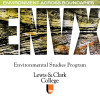26th Annual Symposium
Life within Capitalism: Reconsidering Market Consequences and the Earth System
The U.S. market-based economy influences our decisions in everything from food selection to building construction to childcare. Global challenges of climate change, biodiversity loss, and pollution have led to narratives that identify “Capitalism” and Globalization as fundamental causes of environmental degradation. “Capitalism” is in quotes because Capitalism is not singular nor well-defined: it expresses differently in different places, times, and communities.
In a recent informal poll, Lewis & Clark students ranked “Capitalism” as “the largest environmental disruptor.” Yet at the same time many solutions are grounded in markets, such as business sustainability, carbon taxes or carbon cap and trade, agricultural innovation, and renewable energy.
This inspires some questions: How does the flow of money enable or hinder nonprofit, governmental or for-profit organizations to address our current environmental problems? What should be regulated in a free-market system, and how? How does international trade of materials, goods, and waste affect land, air and water at different scales? If you believe that Capitalism is the root cause of environmental degradation, then what role can markets and industries play in crafting solutions? These questions will be explored through a series of events, including keynote addresses, a panel discussion on the transition to alternative energy, an economic simulation game, and an interactive presentation about the circular economy of waste studies.
Environmental Studies is located in room 104 of Albany Quadrangle on the Undergraduate Campus.
MSC: 62
email envs@lclark.edu
voice 503-768-7790
Symposium Advisor Jim Proctor
Environmental Studies
Lewis & Clark
615 S. Palatine Hill Road
Portland OR 97219

